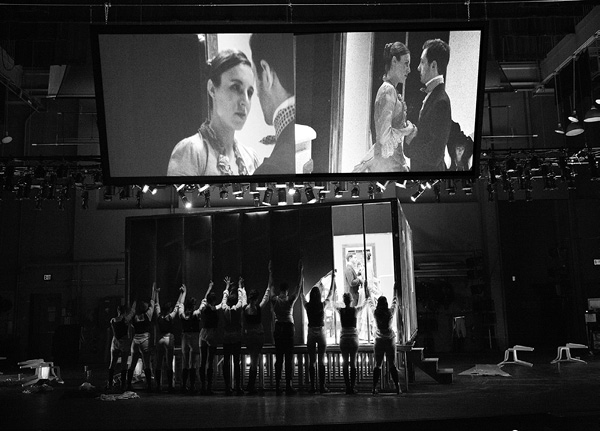
MISS JULIE
first performed on November 14, 2014
Sharp Theater, Ramapo College, Mahwah, NJ
performed seven times in 2014
PETER A. CAMPBELL
Anne-Charlotte Harvey, Laura Ward, Rachel Budin, Caite Hevner Kemp, Jennifer Paar, Steve Fallon, Justin Propper, Angie Turro, Nick Walsh, Stephanie Gonzalez, Sam Simone, Ryan McGilloway, Amber Walker
Mahwah, NJ / New York, NY
peteracampbell.weebly.com
MISS JULIE
PETER A. CAMPBELL
“Doctors say I’m the illest, cuz I’m suffering from realness.” —Kanye West
This production of August Strindberg’s “Miss Julie” was inspired by a desire to explore high naturalism. We wanted to create a highly naturalistic space for the actors to work in, but wanted it to be available to the audience mostly as film. We created a box set that, at the beginning of the play, was a closed drywall box within which is a mostly fully realized kitchen. The action inside was captured on two handheld cameras following the actors creating a two-camera live film that was projected on two large screens above the set. Over the course of the play, much of the drywall was knocked down, opening up and revealing the “live” space as the play progressed.
Strindberg was compelled by film’s potential and limitations:
“Notice how many shots must be taken in sequence by the cinematograph to reproduce a single movement, and even then the image is still shaky. There is a missing transition in every vibration. Where a thousand shots are needed for one movement of an arm, how many would now be needed to depict the movement of a soul?”
In 1908, nearly twenty years after he had written “Miss Julie,” Strindberg encouraged his collaborator and director August Falck “not to stick to the letter” of the text of the play “but to adjust it to the demands of the contemporary stage.” Where Strindberg used extreme intimacy between characters and close-up psychological theatricality, in this production we used close-up film shots. Where he called for pantomimes and ballets, we created music videos. The production outside of this box set was informed by contemporary pop culture—specifically the music and videos of Kanye West, Beyoncé and Miley Cyrus. These references spoke to me, and to my primarily college-age collaborators and audience, about the sexual and class issues of the play. We used the servants on the estate as a chorus that provided a contemporary “frame” to engage the spectators in a contemporary world of clear-cut and complicated misogyny, violence and violent sexuality.
“Miss Julie” takes a hard look at a couple of human souls, and finds them wanting. This production attempted to manifest moral and psychological confusion through the mixing of media presentations, making the struggle of the live and the mediated an expression of the moral dilemmas of our own time.